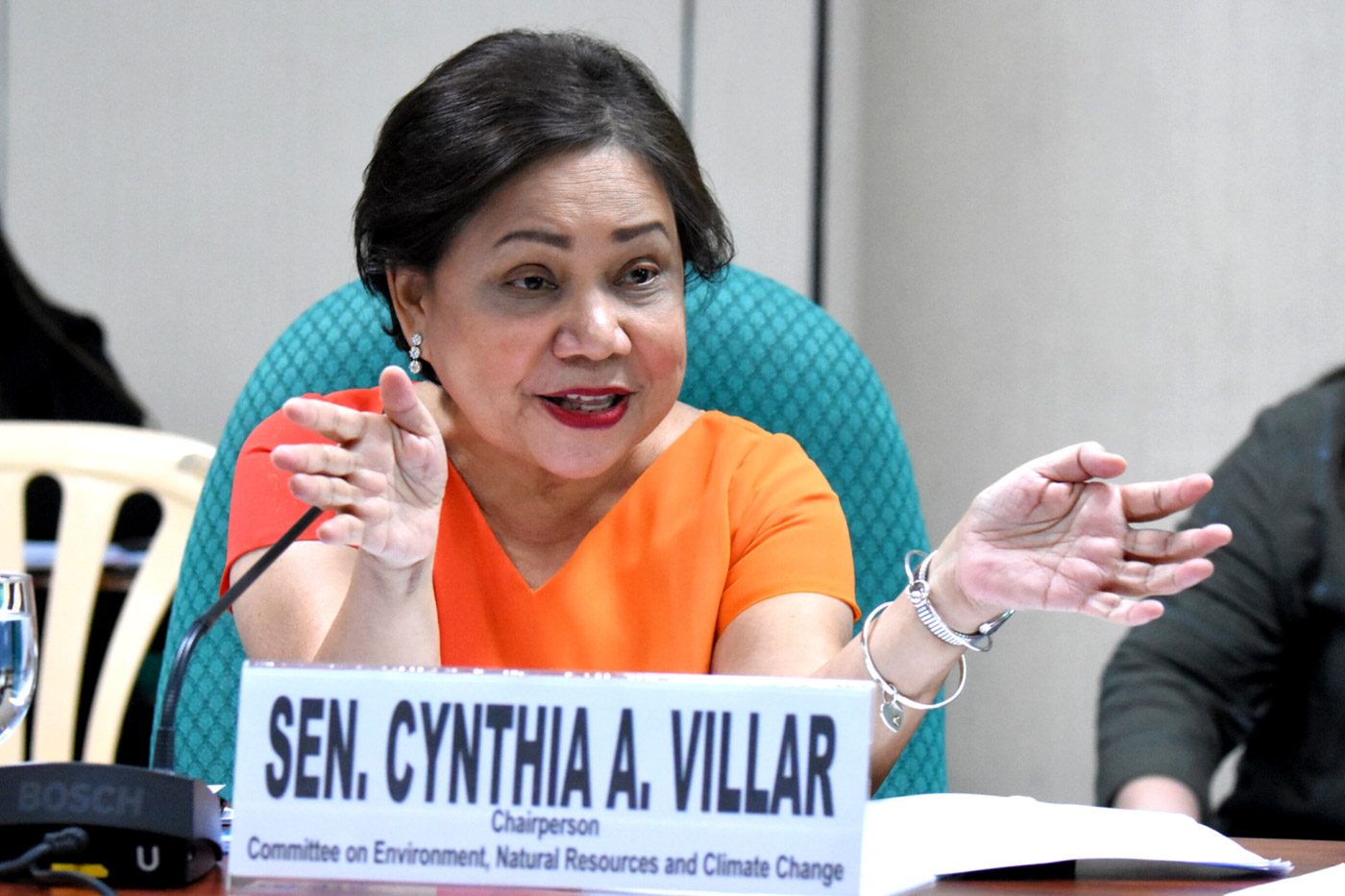SUMMARY
This is AI generated summarization, which may have errors. For context, always refer to the full article.

MANILA, Philippines – Senator Cynthia Villar on Tuesday, February 18, said that banning single-use plastic may be impossible, pending the availability of alternatives to packaging.
Villar, the Senate committee on environment chairperson, held a public hearing on Tuesday on bills filed seeking to regulate single-use plastics, which are among the top sources of plastic trash leaking into oceans.
“Baka impossible to ban – wala naman ako nadidinig na replacement for single-use plastic. What we want is for them to recycle the single-use plastic, unless may dadating na opinion na replacement,” Villar told reporters.
(It might be impossible to ban, as I don’t see any possible replacements for single-use plastics. What we want is for them to recycle the single-use plastic, unless there are new opinions on a replacement.)
Plastic firms resisted against banning single-use plastics during the hearing, pointing out that single-use plastics contributing to pollution can be attributed to consumers’ “lack of discipline.” (READ: Sachet away: What’s lacking in our plastic laws?)
But environmental group EcoWaste Coalition said that a total ban on single-use plastics is still the way to go to solve the problem on pollution.
Villar told reporters on Tuesday that the direction of the Senate committee is to regulate single-use plastics instead.
“What we can do is require them to recycle the single-use plastic; hindi ipagbawal kasi baka hindi kaya, kasi wala naman akong nadidinig na (not ban because it might not be feasible, because I don’t see an alternative) packaging other than glass. Maybe if they can recycle their packaging, that’s okay,” Villar said.
What did the plastic industry say? The Polysterene Packaging Council of the Philippines instead pushed for regulation or reduction of plastic production.
While PPCP admitted to being part of the problem, it said in its position paper: “Displina ang problema at ito rin ang nakikita naming solusyon.” (Discipline is the problem and it is also the solution that we see fit.)
“Ang tahasang pagbabawal ng pag-gawa, pag-bili, at pag-gamit ng single-use plastics ay mangangahulugang pagsasara ng oportunidad sa marami dahil sa pagkakamali at walang disiplina ng iilan,” PPCP said.
(The outright ban on manufacturing, buying, and using single-use plastics means closing opportunities to many just because of a few people’s mistakes and lack of discipline.)
The Philippine Plastics Industry Association (PPIA), meanwhile, said that firms part of the Philippine Alliance for Recycling and Materials Sustainability have committed to reduce waste by withdrawing non-recyclable products and recovering and recycling used plastics from communities.
“The industry fully supports the adoption of waste-to-energy facilities, in Senate Bill No 363, introduced by Senator Sherwin Gatchalian, as this might be a solution to the uninterrupted supply of waste by mandating the strategy in national, provincial, and local solid waste management plans,” PPIA honorary president Willy Go said.
“We should be working hand in hand to address this issue on solid waste The industry alone cannot solve the looming number of waste generation (sic) in the country,” Go said.
What should be done? While the Ecowaste Coalition of the Philippines saw that a total ban on single-use plastics is not “anti-poor,” it does not support waste-to-energy as it is “detrimental to the environment.”
The Ecowaste Coalition pushed for the stricter implementation of Republic Act No. 9003 or the Ecological Solid Waste Management Act, as it is similar to the “zero-waste model.” (READ: The challenges of going zero waste in the Philippines)
“If the question is how to solve the waste management issue and how we can make corporations responsible for it, the answer is to ban single-use plastic products and packaging and implement zero-waste models in our LGUs,” Ecowaste coalition said.
“Incineration is a false solution to the problem for it will just allow corporations to create more waste since ‘it can be burned and turned into energy’,” it added.
Villar’s Senate Bill No. 1331 seeks to amend RA 9003 by institutionalizing the extended producers’ responsibility (EPR) when managing wastes.
This means that firms must recognize their responsibility beyond the sale of their product and providing, for example, for in-store recycling and upcycling.
Environment Assistant Secretary Jesus Enrico Salazar said that the bill, if passed, would “strengthen the need” to recirculate the waste back into manufacturing.
The Department of Environment and National Resources suggested that the bill must include appropriate fines to penalize violators. Currently, the proposed measure does not identify any. – Rappler.com
Editor’s note: An earlier version of this story says the Ecowaste Coalition of the Philippines saw the ban on single-use plastics as “anti-poor.” This is a typo. The coalition believes the ban is “not anti-poor.” The correction is now reflected.
Add a comment
How does this make you feel?
There are no comments yet. Add your comment to start the conversation.